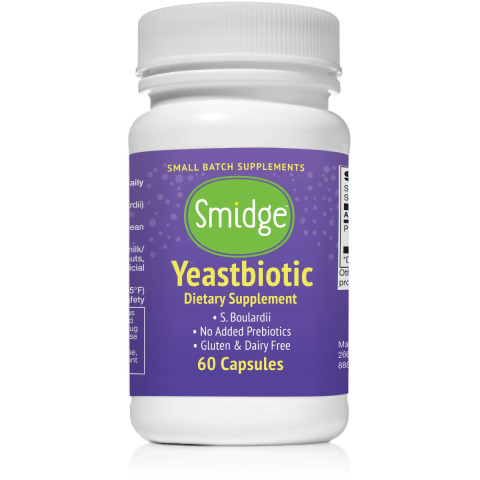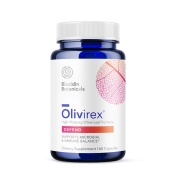YeastBiotic - Probiotics- Smidge™
- Category: Intestines & Intestinal flora
- 3 billion organisms per capsule
- Saccharomyces boulardii
- Antibiotic-resistant
- Free from allergens
- 60 vegetarian capsules
- Shipping within 3 days
- Questions about this product? Call +3124 - 663 53 66 or chat with us
- Details
- More Information
- Product categories
- Alternatives
Smidge™ YeastBiotic Capsules
Saccharomyces boulardii is a non-pathogenic and non-colonizing yeast with probiotic properties. Since it does not involve bacteria, it can be used in conjunction with antibiotics and still survive. The probiotic fungus was discovered in Indochina in 1923. Smidge™ YeastBiotic capsules contain 3 billion organisms per capsule and, except for the cellulose and L-leucine needed for the encapsulation, include no other additives.
Introduction of Smidge™ YeastBiotic Capsules
Smidge™ YeastBiotic Capsules is a supplement containing the particular yeast species Saccharomyces boulardii, which is both acid-resistant and temperature-tolerant. The yeast is originally a tropical species that was first isolated from the lychee and mangosteen fruit in 1923 by the French scientist Henri Boulard. Boulard had discovered that indigenous peoples traditionally use the peel of various tropical fruits as a diarrhea-inhibiting agent and he continued research into this. Saccharomyces boulardii has now been used for over 60 years and three major studies have been conducted in Europe on the effects of Saccharomyces boulardii on diarrhea resulting from antibiotic treatments. In the intestines, this yeast produces lactic acid, butyric acid and B vitamins, among other compounds. The supplement is free from dairy, gluten and other common allergens and should be stored in a cool place.
About the intestinal flora
The intestinal flora, also called microbiome, is an extremely important ecosystem in our body. Did you know that our intestinal system is very personal, just as unique as our fingerprint? Essential substances are produced here, including vitamins and neurotransmitters. The microbiome also plays a key role in the digestion of food and the subsequent absorption of vitamins, minerals and other nutrients. For these processes the body works together with the intestinal bacteria present. The body acts as a host for these microbes. The intestinal flora can be divided into different bacteria and fungi, into desired and less desirable species, and into passing species or permanent residents. As with all life, it is all about balance here.
How do bacteria and enzymes function?
The body works together with the microorganisms present in the intestines for a proper course of all digestive processes. All these microorganisms in the intestinal system have their own function, but they also form an important system as a united whole. When these species are in balance, we speak of a healthy intestinal flora. This balance is different for everyone! Enzymes are the workhorses of our body. They are, as it were, chemical factories that are able to accelerate all kinds of processes in our body, so that these processes do not take years, but often only a few seconds. So digestive enzymes function as a kind of catalyst in our intestinal system. You are not what you eat, but what you absorb. So cherish these little helpers in your gut.
Benefits
- Saccharomyces boulardii is a body-friendly, non-pathogenic and non-colonizing yeast with probiotic properties
- Contains 3 billion CFUs per capsule
- Is antibiotic-resistant and can therefore be taken at the same time as antibiotics
- Smidge™ YeastBiotic Capsules contain no gluten, lactose or other common allergens, are free of prebiotics and are freeze-dried
- Must be stored refrigerated
The unraveling of our intestinal flora
Knowledge about our intestinal flora is constantly developing. We actually know as yet very little about this complex system and our current knowledge is just the tip of the iceberg, but almost all experts agree that it is worthwhile to take a closer look at our gut flora. For example, did you know that bacteria communicate with each other in a special way? Throughout the body, including in the intestines, bacteria are constantly in conversation with each other via a mechanism that we call 'quorum sensing'. They attune their behavior to each other via substances that they secrete, namely signal molecules. Among other things, they can know whether there are many congeners in their area or not, and collaborate with them in ingenious ways. Thanks to their special communication system, bacteria know how to sense whether they are alone or with others and this enables them to work together in ways that we are only now slowly starting to understand.
The History of Probiotics
Although the term 'probiotics' dates from 1953, the principle is much older. The first traces of the use of probiotics date back to the Neolithic period, between 10,000 and 5,000 BC. Cattle herders in the Middle East at the time kept the milk in sacks made from goat skins. Because the sun was shining on it, the milk began to ferment through a combination of lactic acid bacteria and yeasts. The origin of other fermented foods, such as kefir, beer and wine, also dates back to about 7,000 BC. The importance of these, sometimes accidental discoveries, however, came to light much later, in the 19th century. In this century, French chemist and biologist Louis Pasteur developed his theory that the cause of many diseases was a tiny living being, which he called a "microorganism." This microbe theory is one of the most important discoveries in medical history that has led to many new insights in the field of microbiology. However, the real science of probiotics in Europe only started in the 1990s. Since then, probiotics have been the subject of countless clinical studies.
Compiled with care
Smidge™ products are carefully composed in small batches and do not contain unnecessary additives, making them of optimal quality and versatile. Because the products are developed on the basis of the latest insights and because they contain specific neutral bacterial strains, they are well tolerated by almost everyone. The products are therefore also extremely suitable for people with sensitivities or allergies; likewise, they fit right in with diets including GAPS and Paleo diets.
About Smidge™
The three founders of Smidge™ (formerly Organic3) create supplements with the main objective to provide essential nutrients to support a healthy digestive system and to help maximize the absorption of nutrient-rich food. The passion for their business stems from their own experiences of passing disease.
All three have personally found that good nutrition is the key to health and are eager to help guide others on the path to wellness through nutrition. Smidge™ supplements are natural, fresh and produced without additives, making the products suitable for the most sensitive of users.
The name 'Smidge' means 'a small quantity', underscoring the fact that products invariably get produced in small batches in order to guarantee extra quality. This not only prevents unpleasant side effects, but also provides the best possible results. Their vision, research and experience has led to unique products, with formulations inspired by the work of Dr. Weston A. Price and Dr. Natasha Campbell-McBride.
3 billion CFUs, Saccharomyces boulardii (320 mg) †. * Colony Forming Units; † Daily Value not established.


